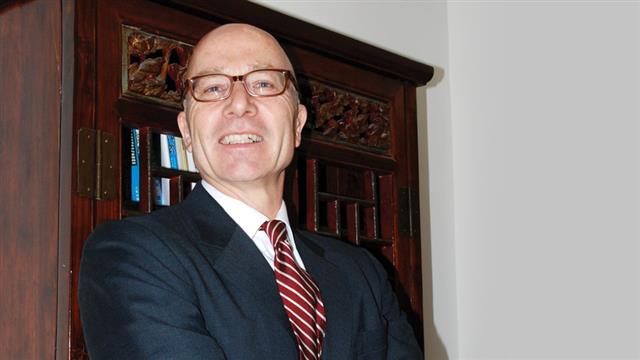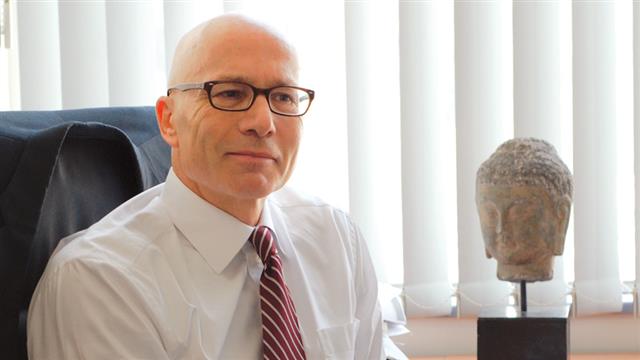Congratulations on your University Education Award. What would be its impact on your teaching?
It is a tremendous encouragement and will inspire me to seek new directions in teaching and research work.
Can you describe CUHK law students in three words?
'Simply the best'. While our law school, established in 2005, is the youngest in Hong Kong, its graduates have soon won the trust of their employers and peers in the legal community, and accolades from leading international academics. They are smart, determined, and creative. They score very high in terms of employer satisfaction.
What brought you to Hong Kong?
My association with China began early in the undergraduate days, and I spent the entire academic year 1983–84 on a foreign student programme in Shanghai. When I was doing my first degree at the University of Passau in Bavaria, I came to realize the potential of China as an emerging world power, and the fast developing global influence of the Chinese language. It was at that time that I began to take up the study of Chinese seriously, so much so that when I first started to work in Hong Kong as an academic, I was able to conduct some lectures in Putonghua. I thoroughly enjoy my present work in Hong Kong, which comprises teaching, research and services, and have found my working knowledge of Chinese a great help and an advantage.
How did your Chinese name 鄔楓 (Wu Feng) come about?
Actually I chose the name myself for the beauty of the way the character 鄔 is shaped and structured. It is indeed a Chinese surname although not a common one, and it sounds close enough to my own name. As a seasoned hiker I am very fond of nature and 楓, the maple, is one of my favourite trees.
Are you interested in oriental art and culture?
While I first came to the East with an interest specifically in the Chinese language and its growing importance in world affairs, I came to love and embrace Chinese culture whole-heartedly during my studies and work in Shanghai, Taiwan, Beijing and of course Hong Kong. You will see that my office in the Lee Shau Kee Building, which is not so spacious, is dominated by two pieces of Chinese art—a mounted stone head of Buddha and a scholar's cabinet. I cannot tell you the age or provenance of the head, but it sits there as a fount of oriental wisdom, and brings tranquility to the room and balance and orderliness to human thoughts. The cabinet is a reconstructed piece but the doors are genuinely antique, and they are about as elegant a pair of doors as you could get to guard your legal documents!
Can you explain why law is 'path-dependent' and must be understood 'in context'?
To put it simply, law is shaped by the social, cultural and economic milieu of the time and therefore must be understood in context. It thus follows that, to understand law, one must have an understanding of those social, cultural and economic contexts. Law cannot exist on its own and be out of touch with society. It is not to be seen merely as a code which is beyond amendments and changes. Values change, and so must the law, especially when society is so diversified, developed and exciting these days.
Why did you take up law?
I have always regarded justice to be of paramount importance, and wanted to be a journalist when I was very young. At that time I thought a legal background would be conducive to a journalistic career, and so I entered law school. However, I got fascinated by my legal studies which really opened my eyes to a lot of things. Since then I have stayed with law without looking back.




